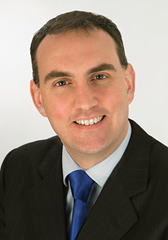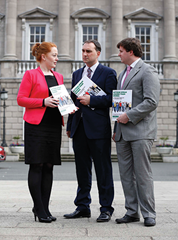Senator Marc MacSharry
 Fianna Fáil Senator Marc MacSharry is a party spokesman on health and sits on the Industrial and Commercial Panel. He has served in Seanad Éireann since 2002, and is a son of former Tánaiste and EU Agriculture Commissioner Ray MacSharry. Marc is married to Marie with one son and one daughter.
Fianna Fáil Senator Marc MacSharry is a party spokesman on health and sits on the Industrial and Commercial Panel. He has served in Seanad Éireann since 2002, and is a son of former Tánaiste and EU Agriculture Commissioner Ray MacSharry. Marc is married to Marie with one son and one daughter.
How did your interest in politics come about?
Politics was unavoidable in our home growing up. For my earlier years, Dad was a full-time politician and public representation was all I knew as his career. My introduction and interest in politics is clearly linked to that early exposure.
Later, he moved off the national political scene though I enjoyed involvement as a young activist in Fianna Fáil, being elected to the National Youth Committee in 1993, participating in elections, party initiatives etc.
My working and business career, of course, then took priority for a decade or so and strangely, having been based abroad in the food export area for a period, the opportunity to run in a national context came later through my work as a CEO within the Chamber of Commerce movement in Sligo. The then Chambers of Commerce of Ireland could nominate someone to contest the election on the Industrial and Commercial Panel, and they picked me and the rest is history. I was re-elected in 2007 and again in 2011, having been unsuccessful in the electoral wipe-out of Fianna Fáil.
What are your personal priorities for this term of the Oireachtas?
On a personal level, the entire issue of personal debt and in particular mortgage arrears is among my major priorities. While much of the media and commentary macro-focus is on the alleged ‘successful’ reduction in the general government deficit and sorting out our ‘banking’ crisis, the reality is that the people are being forgotten in this crisis.
Since 2010 on the government side, I have tried to promote a resolution to the mortgage arrears crisis, starting with the establishment of the Prevention of Family Home Repossessions Group back in Sligo, presenting suggestions to the then expert Cooney group, appointed to consider this issue. Following the election in 2011, I wrote and introduced the Family Home Bill in July 2011 which proposed tangible solutions which put the people first. Sadly, it was voted down by just three votes and two years later we see the banks being given more control not less.
The people have slipped further down the pecking order, it seems, while developments in Cyprus do not give one confidence in how the authorities intend to deal with the genuine despair of citizens. This is undoubtedly an issue I will prioritise and continue to promote in any way that I can.
Also, as a proud north westerner, I am conscious of the piecemeal approach to resource provision in our part of the country. I do not wish to be unduly critical of government at present (nor is it an absolution for the neglect of previous administrations) but our nation must empower the north west to perform to its potential, and that means a larger share of resources in health, transportation and access infrastructure, agriculture and tourism.
Our region can make a sustainable and positive contribution to the national effort if provided with the correct tools. Sadly few governments, including this one, have ever looked on it strategically. It’s dismissed as a thorn in the national side, thrown an odd bone of placation.
 On suicide prevention, what are the key areas in which change is needed?
On suicide prevention, what are the key areas in which change is needed?
Last month, I launched ‘Actions Speak Louder Than Words’, our new policy paper in this area. For several months, I with others worked on this area conducting independent research, looking at the existing body of research and speaking with many stakeholders. It was shocking to find how inadequate current structure, policy and resources are in this area.
Politicians have, for years, fooled themselves into believing they can provide solutions to problems like loss of life through suicide. They cannot, and never will. Politicians must provide the correct structure and resources so that the ‘experts’ in this area may finally begin to peel back the blindfold on the phenomena of loss of life through suicide.
Our new policy does that. It redefines, restructures, adds resources and unites the already many positive forces at work in suicide prevention heretofore under-resourced and fragmented. The result will cost €88 million per year and can be financed, even in the depths of a recession, through harnessing what we believe would be the forthcoming goodwill of revellers enjoying a drink by paying 7.5 per cent extra on all off-sales purchases of alcohol.
How would you sum up the party’s ideology at present?
As an Irish man and a republican, I look back on our history with great pride at our achievements and great regret at our failings. I am not guided by a Civil War-based ideology or even the traditional political pigeon holes of right, left and centre etc.
Today in politics, there can be no absolutes. Society is too diverse and governments need to be flexible in support of that diversity. My ideology is simply to use our party as a vehicle for the delivery of service to the people, to empower them to help themselves and to provide for those who can’t.
Having assessed the mistakes of the past and listened to the judgement of the people, I feel we are rediscovering our true tradition once again: listening, representing, arguing the people’s alternatives. The party is about using its mandate as an opposition party as it is supposed to be used, to represent the voices of people in Ireland. In Ireland’s republic, the people are sovereign, not parties or ideologies. We are trying to listen and act accordingly.
How do you spend your free time?
As anyone involved in politics can testify, there is very little free time but when there is, it is with Marie and the children: going out for a pizza, in the playground or on a family drive, an odd night out on our own, and whenever time permits, a Sligo Rovers match.





